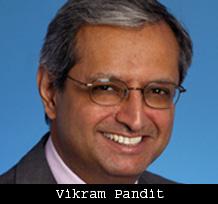Was Vikram Pandit sacked?
It looks like he was. With his abrupt stepping down as the CEO and also from the board, it's clear that the board wanted Pandit to step down immediately. Pandit handed over the charge to Michael Corbat, who led Citigroup's businesses in Europe, the Middle East and Africa. Pandit lost his job in spite of the bank reporting a surprise quarterly profit, and also after leading the bank through the most difficult phase of post-2008 crash. Interestingly, Michael E. O’Neill, chairman of the Citigroup board, said, “We respect Vikram’s decision." But was it really Pandit's decision? O'Neill also added that the board was grateful to "Vikram for his leadership, integrity and resilience in guiding Citi." If that was the case, why did he have to quit the board immediately? He could have guided the new team.
Why was he really sacked?
The safest reason attributed is that he quit because of differences over strategy and execution, which is likely. It seems the bank is going back to its retail banking roots while Pandit has been a Wall Street banker and may not be exactly the right person to lead the bank in that direction. Some like The Wall Street Journal said that Pandit had to quit because of differences over strategy and performance while CNBC said that compensation could have been an issue. Readers may remember that recently, regulators had rejected Pandit's plan to boost payouts to investors and the Citi shareholders had opposed against an increase in Pandit's own pay package. So there had been a bit of face-off between Pandit on the one hand and the regulators and the shareholders on the other.
Did he get the wrong end of the stick?
Vikram Pandit actually led the bank through its most difficult period. He took over at a time when the banks were being bailed out by tax payers, although Pandit helped the bank pay back the $45 billion it took from the government after the Lehman crash. Pandit just drew $1 salary in 2009 and 2010, and started taking his actual pay only after the bank turned in profits. In 2011, he drew a basic salary of $1.67 million. Now, the worst is over and the times are only going to be good. Yes, the stock price has not improved during Pandit's time. But it is expected to go up from here with the bank turning around. But the credit for this will go to Pandit's successor. So we think Pandit has got the wrong end of the stick.
What others think about Pandit’s exit?
The immediate reaction came from Sheila Bair, the former chairman of Federal Deposit Insurance Corporation, when she said Pandit's departure would help Citi. Bair told Bloomberg Radio, “This was a very positive move. I did have concerns about Mr Pandit's qualifications to serve as the CEO of the largest commercial bank because he had never been a commercial banker."
Rating agencies have also responded to the development. Standard & Poor's has said its outlook for Citigroup remains unchanged while Moody's Investor Services has changed its outlook to negative from stable after the resignations of the CEO and COO.
What will Pandit do now?
Vikram Pandit has made his money. Citi would have paid him about $261 million (give or take a few millions as the final compensation and options for this year are yet to be settled) in the five years since he became the CEO. This includes $165 million he got when Citi bought his Old Lane Partners LP hedge fund in 2007 (after which he joined Citi and replaced Chuck Prince as the CEO). Pandit can do nothing and just play golf. But the 55-year-old may take up something like joining as an advisor or a partner with a private equity firm (not exactly a great career these days) or a hedge fund. Another option is that he can even turn to academics. Pandit, after his PhD at Columbia University, started as a faculty member in Indiana University before he was hired by Morgan Stanley.
(Edited by Sanghamitra Mandal)





